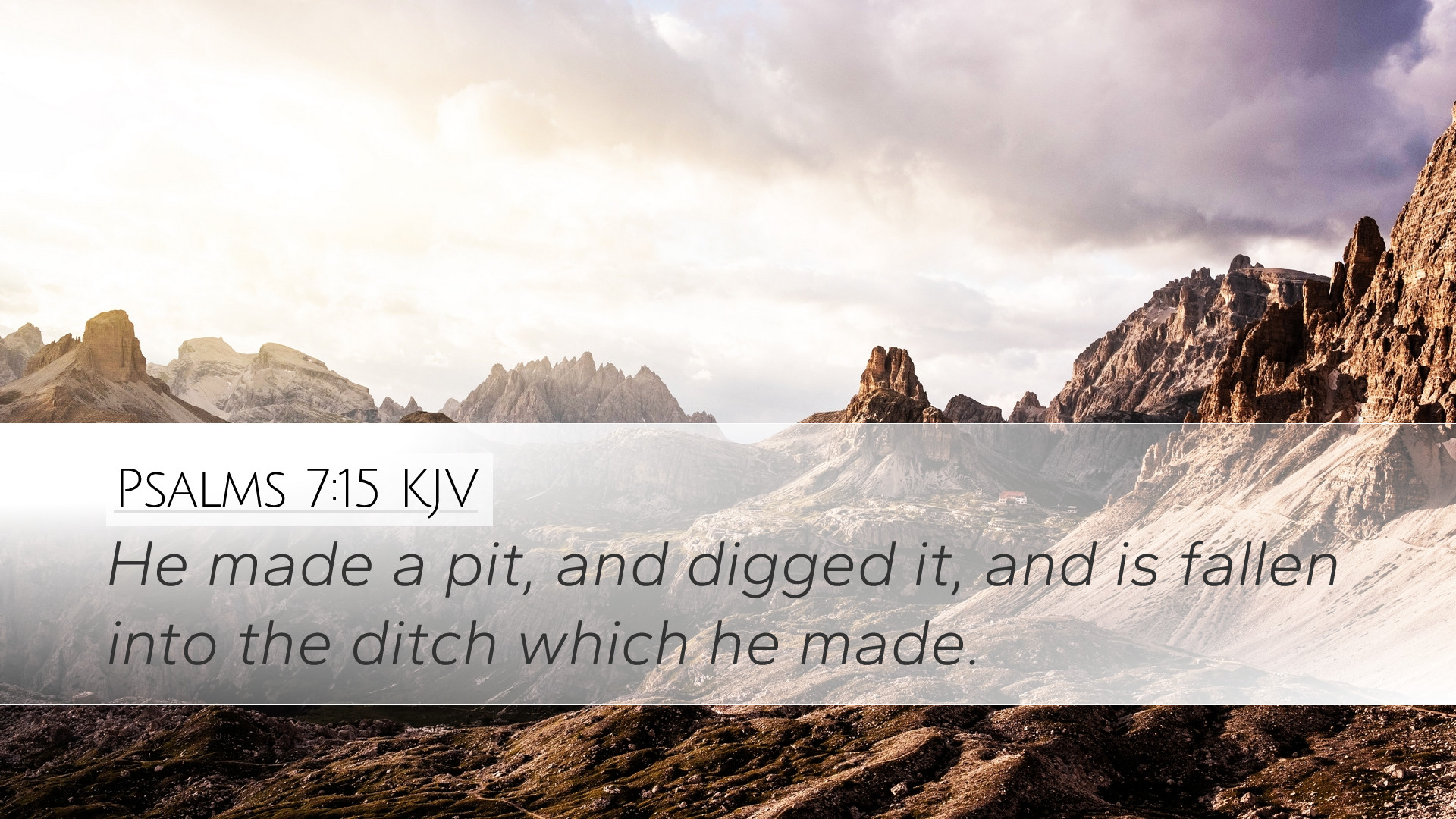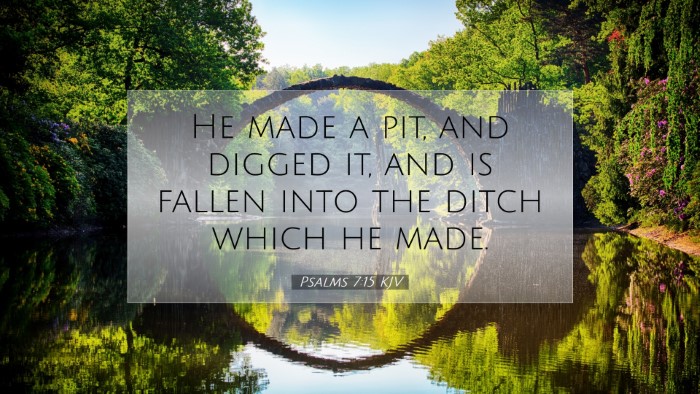Commentary on Psalms 7:15
Psalms 7:15 states: "He made a pit, and digged it, and is fallen into the ditch which he made." This verse encapsulates a profound theological and moral principle, revealing the nature of divine justice and the consequences of human actions. Various public domain commentaries provide insight into this verse, enhancing our understanding for pastoral and theological purposes.
Understanding the Context
The psalm is attributed to David, expressing his deep concern over accusations brought against him. In this context, David seeks refuge in the Lord, illustrating the dynamic between human distress and divine intervention. The setting reflects David's reliance on God amidst overwhelming adversities, emphasizing God's righteousness and judgment.
Matthew Henry's Commentary
Matthew Henry interprets this verse as a warning against those who scheme to harm others. He notes that the "pit" symbolizes traps set by the wicked, implying that their intentions will ultimately lead to their downfall. According to Henry, the wicked man's plans often boomerang, illustrating a key biblical principle where those who scheme against the innocent find themselves ensnared by their own devising.
- The Law of Retribution: Henry highlights the law of retribution, or the principle of sowing and reaping. Just as a farmer reaps what he sows, the wicked shall reap the consequences of their actions.
- God's Sovereign Judgment: The psalm reinforces the notion that God governs the affairs of humanity, ensuring that evil does not triumph in the long run. David's assertion reflects his confidence in God's ultimate justice.
- Personal Reflection: Henry invites the believer to introspection, urging them to avoid the pitfalls of envy and malicious intent characteristic of the wicked.
Albert Barnes' Notes
Albert Barnes brings forth a detailed exegesis of this verse, emphasizing the poetic structure and its moral implications. He posits that the imagery of digging a pit is common in the wisdom literature, indicative of the self-destructive nature of evil intentions.
- Symbolism of the Pit: Barnes elaborates on the concept of the pit as a place associated with death and destruction. He interprets the falling into the pit as a metaphor for the ultimate demise of the wicked.
- Contrasting Fates: The juxtaposition of the righteous and the wicked serves as a thematic element throughout Psalms. Barnes asserts that while the righteous find refuge in God, the wicked are ensnared by their own wickedness.
- Call to Righteousness: Barnes emphasizes the psalmist's call to seek righteousness and avoid the behavior of the wicked, reiterating the psalm's moral teachings for the faithful.
Adam Clarke's Commentary
Adam Clarke offers a critical analysis, presenting this verse as an illustration of God’s justice at play in the lives of individuals. Clarke reflects on the broader implications of the verse regarding the behavior of the wicked and their eventual fate.
- Destiny of the Wicked: Clarke argues that those who plot evil do so at their peril; their actions lead them to their own ruin. The verse serves as an illustration of the self-destructive nature of sin.
- Trust in Divine Justice: He highlights the importance of trusting in God's justice. Just as David sought refuge in the Lord, believers are encouraged to place their faith in God's righteous judgment.
- Exhortation to Believers: Clarke concludes with a poignant message to believers to remain steadfast in righteousness, emphasizing that God observes the actions of humanity and will vindicate the upright.
Theological Reflections
The commentary on Psalms 7:15 reveals several profound theological insights:
- The Justice of God: This verse underscores the nature of God as a just judge who ensures that evil is ultimately judged and that righteousness prevails.
- The Nature of Evil: The verse acts as a mirror, reflecting the self-destructive tendencies of sin and the inevitable consequences that follow. It serves as a reminder that our actions carry weight, directly influencing our destinies.
- Dependence on Divine Aid: David's plea and the subsequent assertion of divine justice encourage believers to remain reliant on God's protection and intervention, reinforcing the belief that personal righteousness and trust in God are paramount.
Conclusion
Psalms 7:15 encapsulates essential themes relevant for pastors, students, theologians, and Bible scholars. Through insights garnered from respected commentaries such as those by Matthew Henry, Albert Barnes, and Adam Clarke, we draw a multi-faceted understanding of divine justice and moral responsibility.
This verse calls us to reflect on our own paths and the impact of our choices while encouraging reliance on God's unwavering justice and protection. As we ponder the truths found within Psalms 7:15, may we be inspired to live righteously, trusting in God's plan and provision for our lives.


